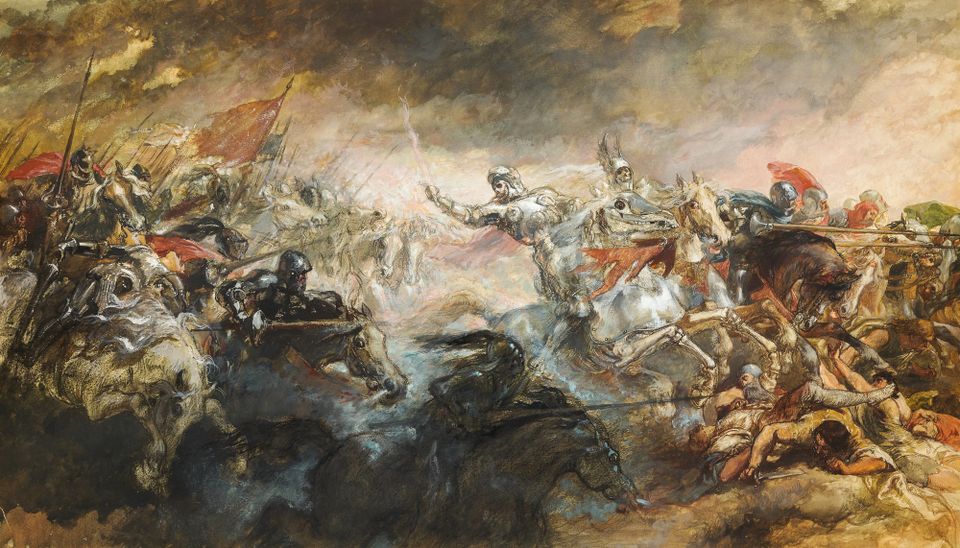Competition Among Groups

As we discussed, humans are social animals—and pack hunters. No matter how strong, skillful and deadly any individual is, they’ll probably lose a fight to a group of 3, 5, or 10. Even when the level of competition isn't direct violence, larger groups tend to produce more, develop technology faster, and generally "win", with the members of the winning group having a better standard of living and more offspring.
For this reason, all human competition is conducted at the group level, and competition between groups is a matter of life and death. (Woe to the pariah who’s group size is one.) While there are various form this competition can take, we know the most extreme: war.
There Were No Easy Outs
The problem is that humans, like all species, have a tendency to increase their population beyond the numbers that can be sustainably maintained by the land. For most of human history, increasing the food or fresh water output of the land was just not an option--at least not in a relevant timeframe. Technology could not be developed fast enough and infrastructure could not be built fast enough (if you even knew how). That meant that each part of the planet had a certain, mostly stable, "carrying capacity" for people.
Things are great when the population is small relative to the local carrying capacity--or when there are plenty of unsettled areas to migrate into. The population pressure never becomes overwhelming. Life was an idyllic existence in Eden.
However, when the population is above the local carrying capacity and there's nowhere to move to--you're in a for a bad time. Often this happened as the result of climate shifts that reduced the local carrying capacity below what it used to be, leaving a previously sustainable population too large for the new conditions. Unfortunately, the only way to resolve the imbalance was to "reduce the population", i.e. for people to die.
That's the "natural" context for the human species. There were no cheats. No new technology was going suddenly be invented to increase the food supply and water supply. If you were born during a lucky time (when the population was much below the local carrying capacity), good for you. If not...it was kill or be killed (or starve).
It's worth noting that this context is far more ancient that humans, or even primates. This is the context under which all life evolved--so this has always shaped the most primal parts of our brains.
Enter Tribalism
Tribes are the fundamental unit of human groups. What is a tribe? A social division in a traditional society consisting of families or communities linked by social, economic, religious, or blood ties, with a common culture and dialect. (The language thing is especially important, but we'll save that for another time).
The thing about tribes is that the lines between insider and outsider are quite bright. This is (morbidly) useful.
There's an unbearable dichotomy required by the human condition. We have this incredible capacity for love and empathy--and it's all adaptive when you're trying to build the cooperation needed for a group to thrive. We have to be honorable, moral, and compassionate to maintain the social bonds that let us be a member of a tribe.
However, when we're engaged in extreme group-level competition, we have to be totally, completely ruthless. First prize is wealth and prosperity (for your tribe, at least). Second prize is death for you and slavery for your children. (And you thought Alec Baldwin was bad!) Only the weak would have empathy for your enemy in that setting.
But how does a human mind accomplish this duality? How can we be incredibly loving, loyal, and self-sacrificing towards (some) people--and totally brutally hellish to other people? How do we live it with it?
The answer is that this duality is built right into our brains. The Dunbar Number is the number of stable social relationships a primate can maintain (which is a function of the complexity and size of that species' brain). For humans, that number is roughly 150--meaning that you can only ever really think of 150 human beings as "people". Everyone else is basically "the thing that brings my food" or the "thing that takes away the garbage".
This may sound strange at first. You might even reject the thought. You don't dehumanize your barista, right? You're a nice person! And sure, you're very unlikely to find yourself drinking wine from their skull--but it turns out, that's because modern society (and technology) makes that very unnecessary.
There are different parts of your brain engaged when dealing with people you know as people and "things". When those parts of your brain are not engaged, you just don't care. There's no empathy, and no morality need apply. What kind of behavioral standards do you hold yourself to in relation to your coffee mug?
This is the reasons that simply revealing personal details is such a powerful bonding tool among strangers--it's causing both sides to engage the social machinery and see other as actual people.
Everything about modern society is designed as a way to get people to cooperate when working outside the natural limits of the human brain's Dunbar Number. This interplay between "insider" and "outsider" contexts is what really drives every social experience in our modern lives.